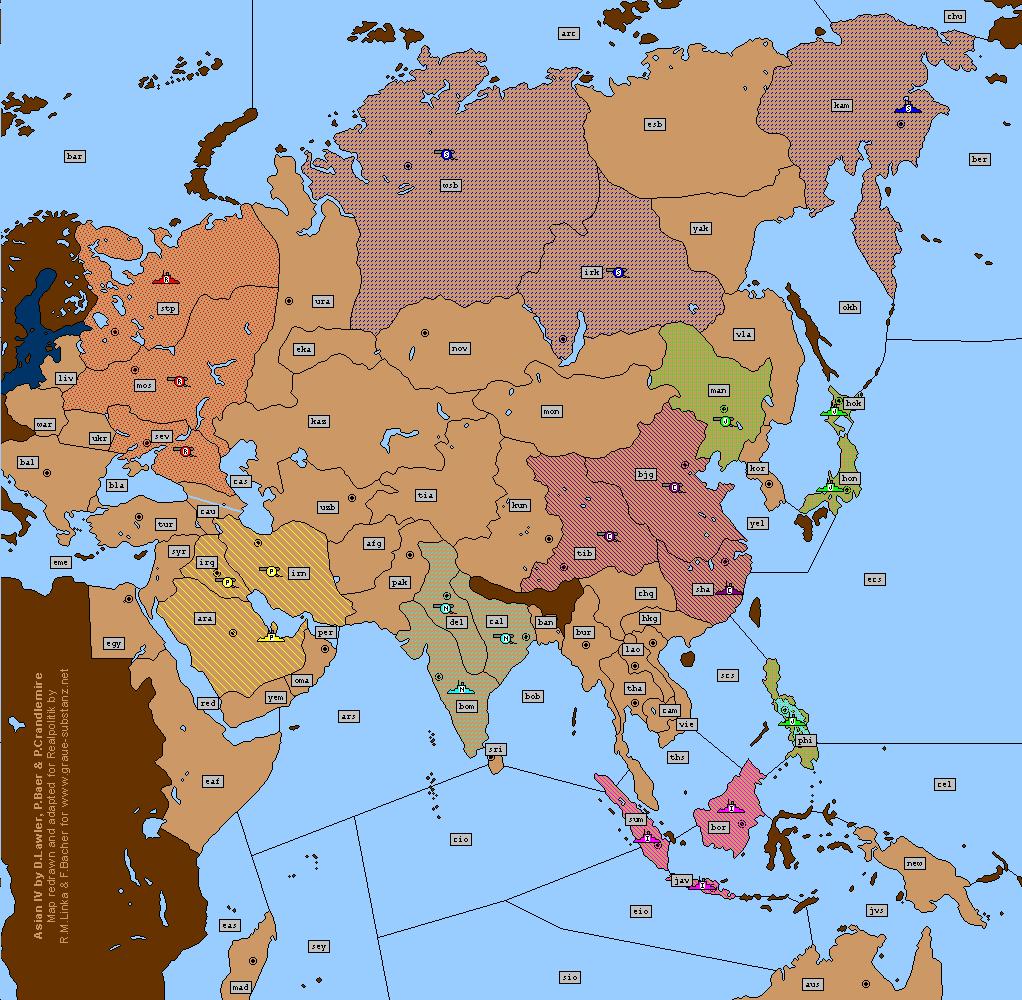Asia
[Description modified from various sources: Diplomatic Pouch (www.diplom.org), Variant Bank (www.variantbank.org), and the Realpolitik info file. For a more detailed description (based on an earlier version of the map), read Pitt Crandlemire's article in the W1996A issue of the DipPouch Zine. Realpolitik files are available for download from Graue-Substanz at www.int.graue-substanz.net].
Asian Diplomacy was originally conceived of and created by David Lawler. It has been updated and modified by Peter Baer and Pitt Crandlemire.
The map extends from Eastern Europe to New Guinea and northern Australia. It incorporates all of Asia plus parts of Africa, Europe, and Oceania. Asian Diplomacy has almost no historical basis.
There are absolutely no rule changes from the standard Dip rulebook. Just a new map.
Canals (in Caucasus and Constantinople) are similar to Constantinople in the regular Vanilla game; i.e. fleets and armies may cross, but only one may be occupying the territory at a time. The Egyptian/Syrian border is similar to the Denmark/Sweden border in the regular Vanilla game; i.e. each has only one coast.
Map clarification: Egypt, Syria, Arabia, and the Red Sea converge at a point; movement is not permitted directly between Egypt and Arabia or Syria and the Red Sea.
Countries and Starting Positions
There are 7 nations. The starting positions are:
China A Beijing A Tibet F Shanghai
India A Calcutta A Delhi F Bombay
Indonesia F Borneo F Java F Sumatra
Japan F Hokkaido F Honshu A Manchuria F Philippines
Russia A Moscow A Sevastopol F St Petersburg
Siberia A Irkutsk F Kamchatka A West Siberia
Persia A Iran A Iraq F Arabia (east coast)
The 18 neutral supply centers are: Australia, Balkans, Burma, Egypt, Korea, Kunlun, Laos, Madagascar, Novosibirsk, Oman, Pakistan, Sri Lanka, Thailand, Turkey, Urals, Uzbekistan, Vietnam, Yakutsk.
Victory Conditions
40 territories are marked as supply centers, and 21 are needed to win.
Errors in the RP Files
1) Yakutsk is not but should be drawn as a supply center (i.e. it does not have a dot). Fortunately, it does behave as one. This problem can be fixed by editing the .bmp file.
2) The map file erroneously treats Hokkaido as being adjacent to Bering Strait but not adjacent to Honshu. This problem can be fixed by changing the adjacency entries for Bering, Hokkaido, and Honshu.
